If hell is truly what the Chinese people believe it is, I am quite excited to die. Having spent my whole life with a family who strongly believes in the afterlife and in burning paper offerings for our ancestors, I never found it to be a strange concept. That was, until recently, when I entered my uncle’s joss paper shop and was faced with a huge assortment of paper luxury goods and “American Hell Money”
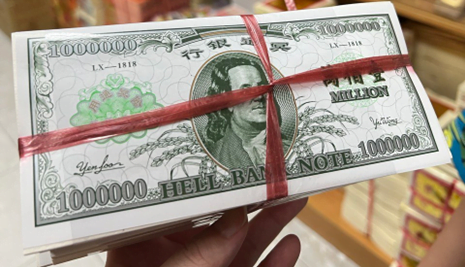
A joss paper shop, as the name suggests, sells that and other goods that Chinese people burn as offerings to their ancestors. Needless to say, I was pretty caught off guard by seeing these million dollar American hell bank notes. My first thought was: we are Chinese, why are we burning American Dollars for our relatives?
To answer that, I asked the owner of the store, my great-uncle Vincent. Vincent is a man in his seventies who has been working in this joss paper store since its opening in 1962, and the third generation owner of this store, having taken over the store in the 1980s after his own grandfather wanted to retire.
“Why American Dollars? It’s because their currency is stable and stronger!”
His reply only caused me even more confusion. Was there a foreign exchange system in hell? And why is the American Dollar stronger, even in Chinese hell?
Before I continue into the rest of this story, let me briefly explain the afterlife and the point of this practice of burning paper offerings.
The Chinese concept of hell, usually called 地狱 (dì yù) literally translating to “earth prison”, is very different from the Christian idea of hell. Rather than it being a final stage in the afterlife that someone will be condemned to forever, it is usually seen as a place where people must first pay for the sins committed in their lifetime, before being reincarnated.
There are many different beliefs about the amount of time spent in hell, and how reincarnation occurs, and it can differ from family to family, as many of these traditions and beliefs are passed down from generation to generation through word of mouth.
During this period in hell, the Chinese people believe their deceased loved ones still need houses, cars, money and other essentials, to get by in their time spent in earth’s prison before they get their chance at reincarnation.
Hence many Chinese people, mainly Taoists, burn paper offerings. Traditionally, people would burn Joss Paper (A rectangular piece of paper with gold or silver foil in the middle that would be folded into the shape of an ingot) or Hell Money (Fake currency, usually with the Jade emperor’s face on it) as offerings to their ancestors.
Ever since I was a young child, I had always seen my grandmother folding joss papers into ingots as she watched her soap operas. These were not used for our own offerings, but instead sold in Vincent’s store. So I asked what was the difference between these ones and the stacks of paper, to which Vincent replied, “In the past, people would fold the joss papers into ingots themselves to show their love. Now, people are busy, they just pay us more for ones that we have already folded. To them, it’s the same thing, the extra money they spend is also a form of love”.
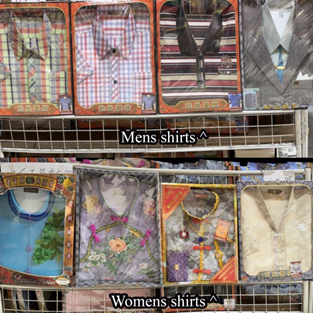
Joss papers are burnt during the funeral of the deceased, on death anniversaries, and during the Qingming Festival (a tomb sweeping festival), or during the Hungry Ghost festival (which occurs during the 7th month of the Lunar calendar, and is where the souls of the dead can come back roam the earth).
Classic paper offerings that people burn would be things like food and snacks, clothes, shoes, or houses. There are also more modern items like paper phones, computers, and their respective chargers. Things that would be considered daily necessities.
My own family only burns these traditional items as offerings, and I tend to visit the joss paper store only once a year during the Lunar New Year, so I was not very familiar with all the types of paper offerings. Only after seeing the American Hell Money did I gain an interest in this tradition, and made another trip back to his store recently to ask more questions.
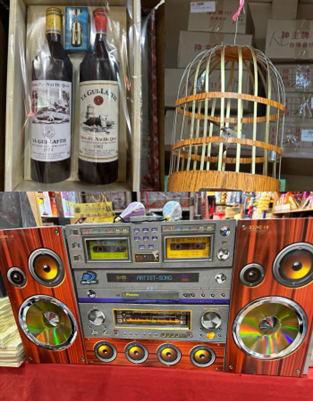
To my amusement, when I asked to see what other paper offerings he had available, Vincent began taking out paper versions of bird cages (fake pet bird included), wine bottles (with paper bottle openers), huge speakers, and even slot machines.
I asked Vincent which of these items were his bestsellers. “Actually, these things are seasonal too. Other than the traditional things that always sell well, my customers love buying whatever new products we bring in. Whatever is new here, they want.”
It seemed that most people were not really thinking about what they burned, just picking up whatever was new and shiny at the store, once again reiterating to me that something about this tradition had really changed.
Given that gambling is considered a sin that someone can be sent to the seventh chamber of hell for, I could not help but feel amused looking at the bright blue paper slot machine sat in front of me. Someone in hell trying to repent for gambling could continue to indulge in their vices in the afterlife if their relatives sent them a jackpot machine.
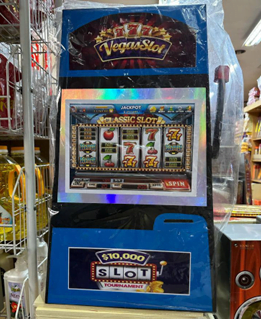
If I could have all the latest technological devices, branded clothing, and my own personal jackpot machine in hell, I would be better off there than I am here.
This made me wonder what the true reason was behind people burning paper offerings. When it was just the basic necessities, I never thought twice about it, after all, everyone needs money, food and shelter to survive. However, when these offerings became excessive, with items that were more like luxury goods than necessities, it made me wonder if the reasoning behind it was something else.
Perhaps it is a case of overcompensating due to guilt. Everyone wants to give their loved ones the best, but for many, being able to afford expensive watches or clothes to give to relatives may not be a possibility.
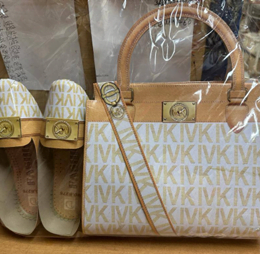
Curious to know Vincent’s point of view on this theory, I asked him for his thoughts, but he would not give me a straight answer. Instead, he told me a story of one of his customers, Ong (name changed to protect privacy) and his motivations for wanting to start burning paper offerings.
Ong walked into Vincent’s store looking anxious one day and said: “Uncle, I don’t know what I need but can you just give me one of everything that I should burn for my mother? It’s been about one year since she passed.”
A relatively young man in his thirties, Ong told Vincent that he had never burned or even purchased joss papers before and had only ever seen his parents do it for his grandparents when they were still alive. This was a rare case, as most of Vincent’s customers were in the older demographic, and the younger ones were usually just tagging along with their parents. Customers usually also have at least a basic idea of what they want.

Upon further questioning, Ong revealed to my great-uncle that two nights ago, he had had a dream about his mother, in which she had been scolding him for being unfilial. In the dream, she had shouted at him: “I have no money to eat, no clothes to wear and no house to live in! For one entire year you have not burned anything for me. Why did I raise a son like this?”
Shocked and alarmed by his dream, Ong rushed to the joss paper shop to purchase some offerings for his deceased mother at the first chance he got. He then proceeded to purchase everything Vincent recommended to him without asking for any prices, and only asking continuously if what he was buying was sufficient. Randomly pointing to items in the shop asking if this and that was good to have, as the only thought on his mind was to “appease” his mother.
After making his selection, the store assistants packed all the items into a bag, where Vincent then proceeded to ask him for his relation to the deceased and for her name and his name in Mandarin characters. Ong did not know the characters for his mother’s name, and hence they had to make do with writing it in English.
At this point, I interrupted to ask why he would need their names, to which he replied without skipping a beat, “When you send a letter you need to write who it’s addressed to and who it’s from right? We need to write so that the deceased can receive it.” I could not argue with that logic.
Filial piety is extremely important in Chinese culture, to the point where some see it as the overall foundation of Chinese society. So important that being unfilial is a sin that is seen as being even worse than committing murder, not being filial can land a person in the eighth chamber of hell, while murder or rape would only land them in the fourth.

Hence, it is not surprising that even after the passing of a parent, a child would feel a strong sense of guilt for not being able to provide them with certain luxuries while they were still alive. This felt even more true as I walked around the store, looking at the packages of luxury watches and branded bags, shoes and clothing. Items that the large majority of people would not have been splurging on while still alive.
The story of Ong, I believe was Vincent’s way of telling me that he, too, felt most of these purchases of paper offerings were more guilt driven than from belief in the actual practice. A son who did not know how to write his mother’s name in mandarin, having that realisation for the first time, further adding to his guilt, then making it up with even more items to send her.
Despite his occupation, Vincent has said that he is a freethinker, but believes in some aspects of these practices. He mentioned that whether or not one believes in the tradition of burning paper offerings, it still has its value in reminding people that they should not forget their ancestors, and also to be filial to their parents.
However, knowing his stance on the tradition, I felt that he was not the best representation of people who practice burning joss papers and offerings. Instead, I decided to turn to my extremely religious and superstitious grandmother, subtly hinting to avoid offending her, wanting to know if she actually believed that burning paper offerings was necessary for her ancestors to have a more comfortable stay in hell.
She laughs a little before saying to me “Some people have children who never call them and only visit them once a year and forget them for the other 364 days. Rather than a child like that who burns every luxury item for me after I’m already gone, I think I would prefer it if my children just spent time with me. No need to buy any bags or clothes, we can just go have a simple meal together.”
My grandmother is so superstitious that even in this day and age, she gets very angry if I go to her house wearing all black, as she tells me I am bringing bad luck into her house. Hence, through her reply, I knew that she did not fully believe in needing to burn paper offerings for actual use in the afterlife. Nevertheless, she continues to burn the offerings together with her siblings whenever there is a necessary occasion for it.
In our modern world, I think that many people no longer truly believe that they need to burn paper offerings to help their deceased relatives get by in hell, but continue carrying out this tradition instead just for the sentiment of it. Even for many people in the generation who did believe it, Vincent told me that although many hope their relatives will be reincarnated one or two years after their passing, they continue to burn paper offerings every year, as a way to remember them.
It can also serve as a reminder to younger generations to be filial, seeing their parents burn offerings for their grandparents or great-grandparents could remind a child that they should do what they can for their parents in life, before the only way they can show their love is through burning offerings.
With every tradition based on superstition, there will be people on the opposing end that believe it does more harm than good. In this case, there are some who feel burning Joss Paper is very harmful to the environment, as mass burning during festivals can cause a reduction in air quality, especially in urban areas. Others think it is a fire hazard, and some simply dislike it, as they think it is a way of earning the money of people who are grieving and vulnerable.
However, as Vincent told me, people are getting more and more busy, and have little time to spend with their family. Many might not realise how lacking they were as a child until the parent is gone, and by the time they want to do better, it may already be too late. In cases like these, if the tradition of burning paper offerings and joss paper helps them feel like they are still able to show their appreciation to their parents and ancestors, I do not think that there is much harm in it. As long as they take caution when they are doing their burning, ensure they do not start fires, and reduce the amount of pollution by burning only the papers rather than the plastic packaging, of course.
Though the items are not cheap, given that they will almost immediately be burnt to ashes, the cost of these offerings are also not exorbitant. People might pay around £40 for a bag that will include joss papers, some food and snack items, clothing, and maybe a phone or two. If that is the price to pay for someone to feel like they have given their loved ones an easier time in the afterlife, in their eyes, it may be a price worth paying.



